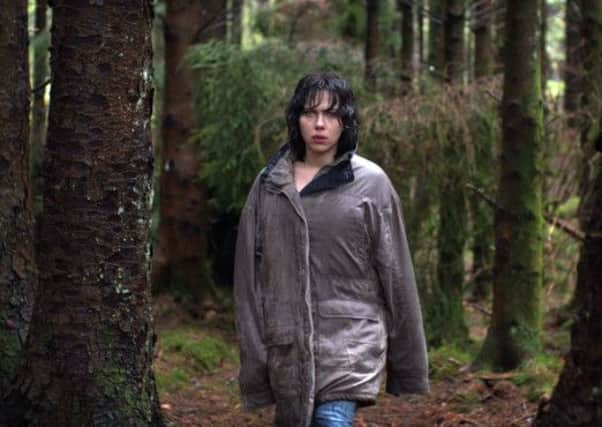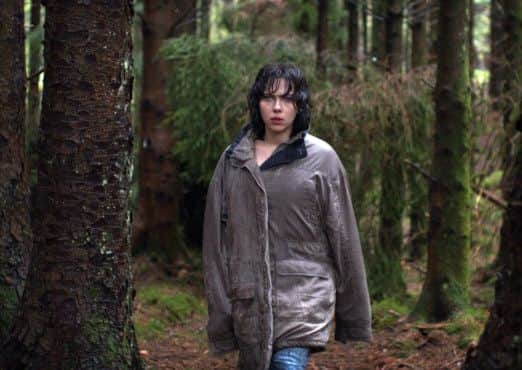Film reviews: Under the Skin | The Zero Theorem


UNDER THE SKIN (15)
Directed by: Jonathan Glazer
Starring: Scarlett Johansson, Paul Brannigan, Michael Moreland, Scott Dymond


* * * * *
Loosely adapted from Michel Faber’s Highland-set novel of the same name, it’s a story of literal and figurative alienation, one that examines the notion of what makes us human by relocating the action of Faber’s book from Ross-shire to Glasgow and using it as a jumping-off point to present a vision of modern-day Scotland through the disconnected gaze of an extra-terrestrial siren (Scarlett Johansson) as she hunts and kills unattached men.
Advertisement
Hide AdThe details of why she’s doing this aren’t exactly forthcoming; Glazer sets the hypnotic tone from the off with a striking opening sequence in which an amalgam of weird images – accompanied by Mica Levi’s cacophonous, astringent score – gradually reveal themselves to be the iris of a particularly luminous eye. That eye belongs to an alien being who takes the form of Johansson, nubile and naked and ready to be birthed into the world as a 21st century temptress.
From here we follow Johansson (stretching herself more than she’s done before) as she attempts to assimilate into society, wandering around Glasgow shopping centres, unobtrusively observing the daily rituals of regular people with the detached curiosity of an entomologist. During the day she drives her van around the city centre, her gaze drifting after any solitary men she sees crossing the streets in front of her. When night rolls around she drives through Govan – and other less-than-salubrious areas of the city – on the prowl for willing punters who can’t quite believe that someone who looks like her is giving them the come-on while asking for directions to the M8.
Shot largely on the fly with hidden cameras and unwitting (at first) participants, the film achieves a strange tension in these moments as the unpredictability of real-life crashes headlong into Glazer’s artistic conceit. Speaking in a plummy English accent and decked out in a dark wig and cheap fur coat, Johansson finds her efforts at picking up local men frequently interrupted – by friends shouting on the person she’s singled out, or mention being made of a loved one or a family (it’s an unspoken trait of the character that she takes home only those who will not be missed).
Those she does invite into her van respond to her small talk with unscripted awkwardness or inarticulate bravado, which can be funny, and a little cringe-worthy too, but only because of how real and relatable it seems. Indeed, this may be why some audience members at the recent Glasgow Film Festival premiere responded so negatively to the film: it’s to misinterpret these scenes as somehow mocking their participants when they do the opposite. Whether the sequences are improvised (as the early ones are) or staged (as a later one is), they’re so startling because the collective humanity of these soon-to-be victims can’t help but shine through, something that starts having a debilitating impact on this alien huntress’s ability to do her job.
That job – which seems to be permanently monitored by a mysterious man on a motorbike – involves luring men to an abandoned house and casting their naked bodies into a gloopy abyss. Only once do we see what happens to them after this, a moment of whacked-out weirdness involving flayed skin that hints at a major element of the book without explicitly acknowledging what’s going on.
As he does with the opening sequence, Glazer – who prior to making Sexy Best was best known primarily for creating the Guinness “Surfer” ad – unleashes the full force of his celebrated promo-making skills here.
Advertisement
Hide AdBut he also knows when to rein them in and the most disturbing moments in Under the Skin are the chilly, low-key ones where Johansson’s automaton attempts to understand and process human emotion.
Undergoing a sort of abstract awakening, she becomes more vulnerable and more human the more aware she grows of her own alien otherness, leading to a remarkable dénouement that suggests the urge to destroy what one doesn’t fully understand is an alien trait that’s all too human.
Advertisement
Hide AdIt all adds up to a remarkable and audacious piece of filmmaking, beautiful and rough-hewn, and fully engaged with its location in a way that so few films made in Scotland ever are (when Scarlett Johansson is seen puzzling over a radio phone-in debate on independence, it grounds the film in the here and now in way that Filth and Sunshine on Leith actively avoided). Mostly, though, Under the Skin is like its star: enigmatic and alluring to the end.
OTHER FILM RELEASES
The Zero Theorem (15)
Star rating; * * *
Shot fast and cheap with relatively few production woes, The Zero Theorem turns out to be Terry Gilliam’s most vital film for a while.
A Brazil-influenced riff on the information-overload of the digital age, it revolves around Qohen Leth (Christoph Waltz), a data-cruncher whose inability to find answers to the big questions has made him certifiable in a world where everyone is desperate to be virtually connected to everyone else. Bald and baby-like in appearance, Qohen talks in the “royal we” to feel more connected to people, yet stands alone at parties while others dance around their iPads checking their “sit-on-my-facebook” profiles. In a little nod to 12 Monkeys, he’s waiting for a phone call that he thinks will explain his purpose in life and has created such an elaborate fantasy around this hitherto disconnected call, he can no longer countenance the notion that it may just have been an unsolicited marketing pitch.
His virtual therapist (a Scots-accented Tilda Swinton) and bewigged co-worker (David Thewlis) can’t get through to him, but his employers, a communications corporation with the benign sounding name of Mancom (motto: “making sense of the good things in life”), see potential profit in his madness and set him to work trying to prove the titular Zero Theorem, a Big Bang-like explanation of the universe that will, insists management (embodied by a white-haired Matt Damon), prove life has no purpose.
A worker bee determined to find meaning in his existence while working for a corporation determined to prove existence is meaningless is a very Gilliam conundrum, and the director certainly has fun with all the thematic and visual possibilities it throws up.
In respect to the latter, his trademark retro-future designs – big screens with flashing lights; wires and cables hanging out all over the place – may seem outdated in an age of sleek, compact, aesthetically pleasing gadgets, but depicting technology with its guts hanging out, so to speak, makes it symbolic of the somewhat sinister intent behind the faceless techno-behemoths currently mining all our personal data to who knows what end.
Advertisement
Hide AdHoning all this into a coherent plot is another matter and, as frequently happens with Gilliam’s films, the story gets away from him a little bit, particularly as Qohen retreats into the sanctuary of his abandoned church abode, then into a virtual world in which he finds love with a buxom call girl (Mélanie Thierry) whose real-life rawness is too much for him to handle. Nevertheless, Qohen’s inability to understand that the pain of life is what sometimes makes it worth living gives The Zero Theorem a somewhat tragic edge that makes its more moving than expected.
Need for Speed (12A)
Directed by: Scott Waugh Starring: Aaron Paul, Imogen Poots, Dominic Cooper, Michael Keaton
Star rating: *
Advertisement
Hide AdNeed for Speed must have looked so good on paper: fast cars, sexy young cast, an audience primed for high-octane stunt driving after the phenomenal success of the Fast and Furious franchise… Shame, then, that this abysmal action vehicle for Breaking Bad’s Aaron Paul is so awful in so many fundamental ways it stalls in the opening minutes and barely gets out of first gear over the next two-and-a-bit hours.
Blame director Scott Waugh (Act of Valour), a former stunt co-ordinator with a tin ear for dialogue, a blind eye for action and an arboreal touch when it comes to performance. The spurious plot involves Paul breaking parole to avenge a friend’s death (and prove his own innocence), something that necessitates him driving cross-country with Imogen Poots to participate in a secret road race. The end result – loosely inspired by a video game – feels like chop-shopped amalgam of Vanishing Point and Death Race 2000, made by someone who’s never seen a car chase movie in their life.
The Stag (15)
Directed by: John Butler
Starring: Andrew Scott, Hugh O’Conner, Peter McDonald, Amy Huberman
Star rating: * *
Amiable rather than raucous, this Irish male-bonding comedy forgoes the gross-out giddiness of The Hangover in favour of earnest character development, mild debauchery and a rather timid approach to male nudity. Indeed, the literal lack of balls on display proves symbolic of the film as a whole, with bride-to-be Ruth (Amy Huberman) initiating the titular bachelor party after her set designer fiancé, Fionnan (Hugh O’Conner), proves just a little too interested in the minutiae of their impending nuptials for comfort.
Comedy gay panic established, the film swiftly strands Fionnan, best man Davin (Andrew Scott) and a not very motley crew of friends and relatives in the wilderness where a succession of hijinks lead to guessable revelations, recriminations and the occasional group hug. Obligatory obnoxiousness comes in the form of Hugh O’Conner’s enigmatically named The Machine, but while he’s trying way too hard to be outrageous, the rest of the film isn’t trying hard enough.
Plot for Peace (12A)
Directed by: Mandy Jacobson and Carlos Agulló
Star rating: * * *
“I know questions are already being raised about whether audiences will be gripped by my story,” announces Jean-Yves Ollivier near the beginning of this documentary about his behind-the-scenes contribution to the dismantling of apartheid in South Africa. “Well,” he sighs, “that’s up to the audience.” That maybe so, but directors Mandy Jacobson and Carlos Agulló seem awfully determined not to leave anything to chance, over-egging proceedings by filming the opening sequences like a Bourne movie. Once the film settles down, though, it’s mostly a talking-heads affair detailing the complex ways in which this French-Algerian commodities trader’s sanctions-ignoring business interests in South Africa eventually had a positive impact on the country. Though Nelson Mandela barely features, the film’s attempt to guide us through the complex geopolitics of the era is admirable.
Veronica Mars (12A)
Directed by: Rob Thomas
Advertisement
Hide AdStarring: Kristen Bell, Jason Dohring, Enrico Colantoni, Jerry O’Connell
Star rating: * * *
Funded through Kickstarter by fans still mourning its early cancellation, this big-screen resurrection of cult TV show Veronica Mars may be more remarkable for what it says about fan devotion and new funding models than its merits as a film, but it’s still an entertaining, pop culture-savvy detective movie. Where the show focused on its eponymous protagonist’s status as a high-school gumshoe, the movie picks up the action nine years on, with Veronica (again played by Kristen Bell) now a lawyer, drawn back to her beachfront hometown of Neptune after a former classmate is murdered. Devotees will get more from the endless parade of minor characters than newbies, but Bell’s withering sarcasm is a blast and there’s a priceless cameo from James Franco.